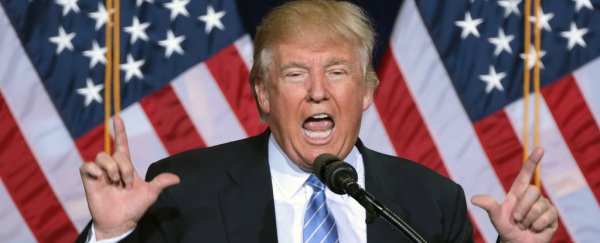President Trump's meeting with Putin has taken over the news cycle this week, and when the future of US intelligence and national security is at stake, it makes sense why. But while everyone was looking left, Trump was already over there, on the right, voicing some of his most bizarre thoughts on climate change.
Just after finishing up at the notorious Helsinki summit, the first thing President Trump did was sit down with Fox News' Sean Hannity to talk about what he thinks is the greatest threat to humanity.
"To me, the most important issue is the nuclear issue," he said, "because I know President Obama said global warming is our biggest problem and I would say that no, it's nuclear warming is our biggest problem by a factor of about… five million."
"To me, the most important issue is the nuclear issue."
— Fox News (@FoxNews) July 16, 2018
President @realDonaldTrump sits down with @seanhannity for his first interview following his meeting with Russian President Putin. Tune in tonight at 9p ET on Fox News Channel. https://t.co/CXfv7TtOdd pic.twitter.com/7Czrk17irb
At this point, if you're wondering what "nuclear warming" actually is, or if you're questioning President Trump's nonsense and impulsive mathematics, you are in good company. Three days after the interview, it's still unclear what President Trump meant by the new term, and like the infamous covfefe, instead of clearing up the confusion, the commander-in-chief has left the bewildered public guessing.
#tRump on Hannity now: “Nuclear warming is our biggest issue.” WHAT IN THE ABSOLUTE HELL IS NUCLEAR WARMING?? #TreasonSummit
— Andrea dog lover (@iliveonavenue5) July 17, 2018
Erm. Wtf is “nuclear warming” @realDonaldTrump...? I mean I know you’re, like, really incredibly smart... so I’m sure you know what you’re talking about, right?
— Jon Nicholas (@jonathanwithnoh) July 17, 2018
Try explaining cloud computing to a man who claimed nuclear warming is 5 million times more dangerous than global warming today.
— meadow life (@meadow_life) July 17, 2018
Some have suggested that President Trump was referring to nuclear proliferation. Others thought he was talking about the effects of a nuclear weapons attack.
Pres Trump: Russia Pres Putin said he wants to help with North Korea
— Stare Decisis (@MsResJudicata) July 16, 2018
Fox interview
"Nuclear warming" (a nuclear weapons attack) is our biggest problem
Experts who study the fall-out of nuclear war, however, think it would cause global cooling and not global warming. If 100 Hiroshima-sized nuclear bombs were set off, for example, experts at NASA have predicted that it would cause temperatures on the ground to fall by a little over 1 degree Celsius (1.8 degrees Fahrenheit) in the first three years.
"Agriculture, for example, would likely be disrupted from the combination of cooler temperatures, less precipitation and decreases in solar radiation reaching the surface," said Luke Oman, a climate scientist at NASA's Goddard Space Flight Center.
"This would cause widespread interruptions to growing seasons by producing more frequent frosts."
Most scientists would agree that nuclear war is a threat to humanity. Earlier this year, the Doomsday Clock, which symbolizes the likelihood of a human-made global catastrophe, was moved forward by atomic scientists after rising tensions in the nuclear realm. The Clock is now closer than it has ever been to Doomsday since the height of the Cold War in 1953.
At the same time, the vast majority of scientists are convinced that climate change presents a clear and imminent threat to the future of humanity. Last year, more than 15,000 scientists signed an article that warned humans are on a collision course with the natural world. The document argued that if immediate action is not taken to combat climate change, we will be unable to avoid substantial and irreversible harm to the environment.
All of these arguments are informated by science, data and reason. But, to state the obvious, what President Trump said about nuclear warming is not scientific… at all. (Something that his chief science advisor could have easily told him had Trump actually appointed someone to that position).
Whatever nuclear warming actually means, it appears to live solely in the imagination of President Trump.
Science AF is ScienceAlert's new editorial section where we explore society's most complex problems using science, sanity and humor.
